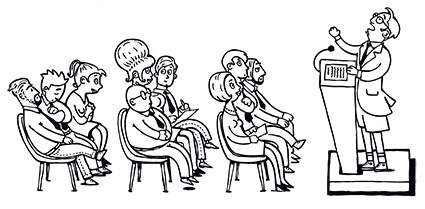
When you want to inform many people simultaneously on an important subject, a general meeting is a good way to do it.
An information meeting/general meeting is essentially a one-way communication and should not be confused with a dialogue. This is primarily a method for informing citizens, e.g. introducing a large dialogue project and informing a large group on how the work will proceed. Another example could be when the management wants to inform on a decision already made, including the basis and facts. Verbal information should be supplemented with written information/presentation materials of various kinds. A general meeting puts very high demands on the leader of the meeting. The aim and the agenda of the meeting must be clear to everyone. Make clear in the invitation that this is an information meeting and not anything else. Often, there are discussions one way or another. All participants will not be heard, however. In most cases it is only those who dare express themselves in other contexts who put forth their views and opinions. If the issue considered is controversial, many participants run the risk of having difficulties to assimilate substantial information. Because of this, it takes an experienced organiser to lead the meeting, let various participants speak, and handle various situations. A general meeting is easy to accomplish if you want to spread similar information to many people at the same time. This form should not be used if the aim is to acquire substantial views and have a dialogue.
An information meeting/general meeting is essentially a one-way communication and should not be confused with a dialogue. This is primarily a method for informing citizens, e.g. introducing a large dialogue project and informing a large group on how the work will proceed. Another example could be when the management wants to inform on a decision already made, including the basis and facts. Verbal information should be supplemented with written information/presentation materials of various kinds. A general meeting puts very high demands on the leader of the meeting. The aim and the agenda of the meeting must be clear to everyone. Make clear in the invitation that this is an information meeting and not anything else. Often, there are discussions one way or another. All participants will not be heard, however. In most cases it is only those who dare express themselves in other contexts who put forth their views and opinions. If the issue considered is controversial, many participants run the risk of having difficulties to assimilate substantial information. Because of this, it takes an experienced organiser to lead the meeting, let various participants speak, and handle various situations. A general meeting is easy to accomplish if you want to spread similar information to many people at the same time. This form should not be used if the aim is to acquire substantial views and have a dialogue.
 RSS Feed
RSS Feed
